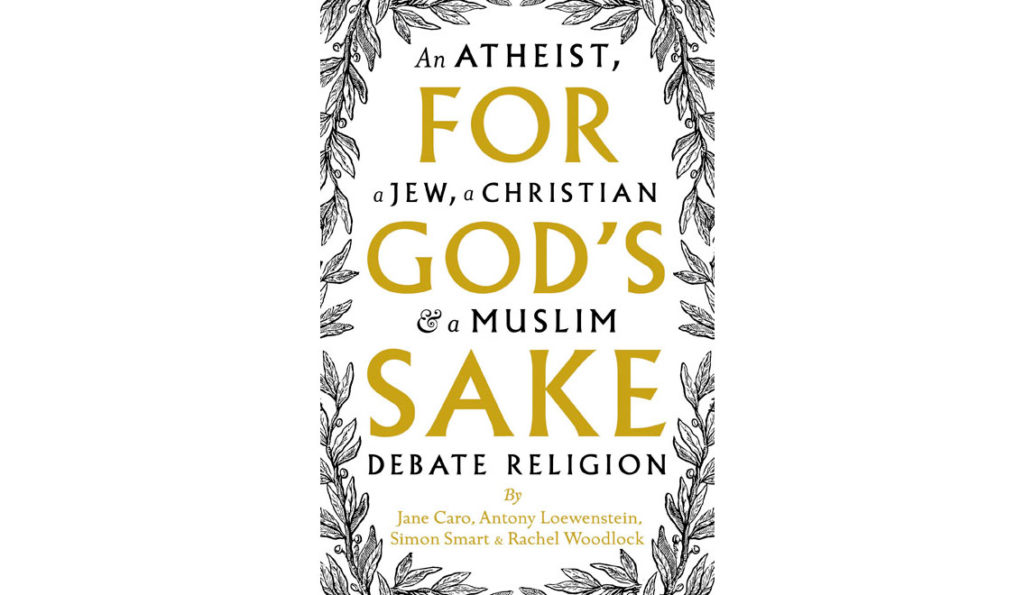Australia/Israel Review
The Biblio File: Faithfully Offensive
Jul 30, 2013 | John Levi

John Levi
For God’s Sake: An Atheist, a Jew, a Christian and a Muslim Debate Religion
By Jane Caro, Antony Loewenstein, Simon Smart and Rachel Woodlock; Pan Macmillan, Australia, 2013.
There is the classic story about a young couple who came to see a Rabbi. The Rabbi listened attentively to their problem and said to the wife “you are right”. The husband put forward his case. The Rabbi listened carefully to him and said “You are right, too”. The Rabbi’s wife overheard the interview and questioned her husband, ‘If she is right and he is right, how can you be right?” The Rabbi replied “And you are right too.”
I happen to know two of the protagonists in this debate, in book form, about religion. I shared a pre-doctoral seminar with the brilliant Rachel Woodlock who is a Bahai convert to Islam. And, to my eternal embarrassment, I was once Antony Loewenstein’s rabbi. The publisher’s press blurb describes Loewenstein as “proudly culturally Jewish but vehemently anti-orthodox”. That description is bizarre.
As we all know, arguing about religion is pretty pointless. It is usually a case of “I am right” and “He is wrong”. Except for Jews. Jews don’t see the world in a binary, right and wrong, Hellenistic process. The sacred texts of Judaism don’t work that way. In the first place they were written in a language that didn’t inscribe the vowels. You have to fill in the gaps by yourself with the aid of tradition and common sense. And tradition often provides us with alternative truths.
For example, one narrative in Genesis says that the animals entered Noah’s ark two by two while a parallel account speaks of the “clean” animals being saved from the rising waters seven by seven.
The question of which account is factual is regarded as irrelevant. You can choose one or the other and/or both. As Rachel Woodlock writes in the concluding section of the book “there is a difference between factuality and truth” and the deepest religious truths are frequently expressed in metaphor and myth.
And so, on to the “debate”.
Jane Caro, explains that she is an atheist and introduces the book by writing how “revealing (it was) to me personally to see what we all agree on” with “grace, humour, civility, flexibility and decency.” If only those words were true. It is hardly gracious of Antony Loewenstein to dub the only Jewish State in the world “an occupier and a brute” and write that “mainstream Judaism has largely become, a deformed beast.”
Thank you Jane Caro for publishing such a “civil”, “flexible” and “decent” vituperative assault on Israel and Judaism and for obviously not understanding how offensive Loewenstein is.
Dr. Kenneth Levin, a clinical instructor in psychiatry at Harvard Medical School, has written a book called The Oslo Syndrome – Delusions of a People Under Siege (Smith and Kraus, 2005) which defines such behaviour as the “delusions of the abused” (p. xvii). On examining Jews by birth who perceive other Jews as conforming to antisemitic caricatures. Dr. Levin writes “Both the self-deprecating and grandiose distortions of reality have a common source. A wish to believe Israel to be in control of profoundly stressful circumstances over which it, unfortunately, has no real control. Genuine peace will come to the Middle East when the Arab world, by far the dominant party in the region, perceives peace is in its interest.”
Leaving the Middle East behind us, the remaining chapters of the debate are enjoyable and often enlightening. Theologically, a monotheistic Jewish reader will inevitably feel most comfortable with Rachel Woodlock’s Sufi faith. Simon Smart articulately presents an enlightened Christian viewpoint but, if you don’t believe that Jesus of Nazareth was the epitome of everything good, much of his commentary is lost. Jane Caro, the designer of the debate contentiously presents a rather naïve and unsophisticated atheistic narrative.
Theologically, we are all post-Holocaust and post-Hiroshima communities with the terrible prospect of a nuclear confrontation. The four contributors were asked to write about the impact and existence of evil and their answers are, for the most part, blithely inadequate. I would have expected all four of them to dwell on the events of the murderous twentieth century ranging from Rwanda to Cambodia, Mao to Stalin. They didn’t. To his credit, only Loewenstein deals movingly with the Holocaust but then carefully explains how he recently claimed a German passport because of his (annihilated) relatives.
It is good to read an Australian book whose theme is the state of religious belief. It is easy to read and entertaining. But sadly, a Jewish reader will also feel frustrated and hurt.
Rabbi John S Levi AM is Rabbi Emeritus of Temple Beth Israel in Melbourne and a historian who has published a number of books on the history of the Australian Jewish community.
Tags: Australasia






